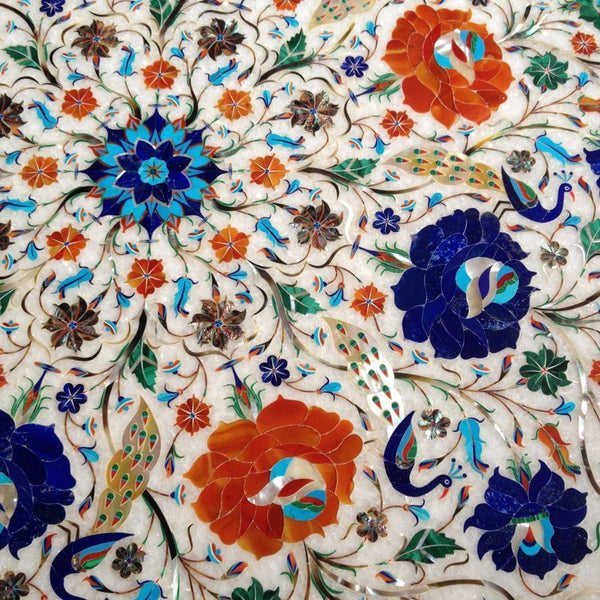Inlaid with lapis lazuli, turquoise and malachite, the mosaics the Taj Mahal are a testament to the beauty of this art form as well as its power to evoke emotion. Known locally as “Parchin Kari”, many who have come to personally see the Taj Mahal have also come to appreciate the detailed craftsmanship that has been poured into the inlaying of the majestic white marble. People have called the precise work on the marble as nothing short of an artistic phenomenon, knowing that it is able to add depth and richness to the entire monument and that it is able to seamlessly work together with all its architectural features.


It is said that the existence of Parchin Kari indicates the presence of Italian craftsmen in the Mughal court due to its similarity with the Roman pietra dura. Nevertheless, Parchin Kari is still considered very unique and its development in India is considered as a milestone when it comes to art and craftsmanship. The Taj Mahal is considered as a tear drop in time, a structure that embodies the eternal love of Shah Jahan for his queen, Mumtaz Mahal; and those who graced the Taj Mahal through their skill and mastery of art and architecture, were also graced in return by the Taj Mahal as their works of art have stood for hundreds of years, to be displayed for generations to come.



Made with a base of white Makarana Marble, artisans spent countless time mining the materials, securing the precious stones and crafting the finest details of the mosaics. The Mughal Emperor employed the best inlay workers, giving them a place where they can live and work in Agra. Master craftsmen supervised all of the workmen, they made sure that the marble was transported carefully and that those who did the inlays received the proper plans and materials intended for calligraphy, floral or geometric designs. By creating precise cavities on the marble with the use of iron chisels, the craftsmen were able to fix carefully cut and polished semi-precious stones. These people were able to create through their skill, creativity and mastery, something which can only be described as an unprecedented achievement of their time.



The beauty of Taj Mahal’s pietra dura work reminds us of not just the elegance and beauty of mosaics, but also of the true resilience of this artwork. Many appreciate the overall beauty of this monument, but only those who have seen the Taj Mahal personally have come to experience the power of its detailed mosaics. Each mosaic shows precision, elegance, and delicateness, perhaps portraying the Shah’s tender love for his fragile queen. The polished stones and the meticulous handiwork are able to accent the entire structure, adding beauty without being overly complex.
Last but not least, today, the mosaics of the Taj Mahal remains to be a source of inspiration for artists. It reminds us that mosaic art is not just for decorative purposes, but the art form can also embody a deeper meaning, or portray powerful emotion.


Have you ever been to India? In one word, how would you describe your experience? Share your thoughts with us about the Taj Mahal and let us know if you have visited cities enriched with decorative architecture and mosaic artworks…
Got inspired by reading this article?
You May Also Want To Read: Mosaic Magnetism at The Vatican Museum
Don’t Forget to Subscribe to our Newsletter for Weekly Updates on Mosaic Art, Decor, Creativity and Much More!


5 commentaires
GR8,may I have detailed photo
GR8,may I have detailed photo
These mosaics are beautiful and natural indeed!
These mosaiacs are very natural :)
These mosaiacs are very natural :)